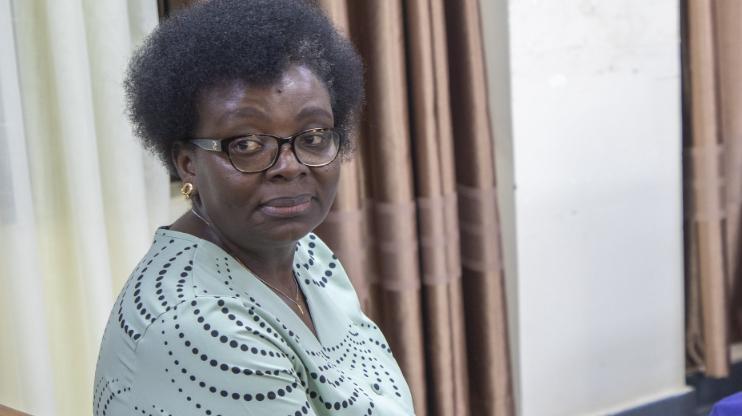Africa-Press – Rwanda. Last week, a disturbing video circulated on social media showing a group of Mai Mai (Wazalendo) militia in Fizi, South Kivu, parading captured Wanyamulenge Tutsi women and children.
One of the militiamen is heard saying, “This Tutsi baby here, he is the one who will fight me tomorrow. Look at his long nose, son of a bitch. We’re going to wipe you out. You have run into Mai Mai.
These Wazalendo fighters, formerly known as Mai Mai, have been embraced by DR Congo’s President Félix Tshisekedi as defenders of Congolese sovereignty.
Around the same time, Victoire Ingabire Umuhoza appeared in another video praising the Wazalendo. “I admire Wazalendo,” she said. “I recently listened to your president’s interview when he said they are compatriots defending their rights, their property, and refusing to continue to endure.”
Her public admiration for a group threatening genocide against the Tutsi should surprise no one familiar with Ingabire’s ideological track record.
From the Netherlands, Ingabire long supported the Forces Démocratiques de Libération du Rwanda (FDLR), a militia founded by perpetrators of the 1994 Genocide against the Tutsi.
As the FDLR seeks to eliminate Tutsi in Rwanda, the Wazalendo, formerly Mai Mai share the same objective in eastern DR Congo. Her endorsement of such a group underscores the persistent danger her rhetoric poses, not only to Rwanda but to the entire Great Lakes region.
Following these developments, Ingabire was arrested in Rwanda on June 19, 2025. Her supporters rushed to social media to portray her as a victim of repression, arguing she is Rwanda’s hope rather than its threat. But what does she truly represent?
Victoire Ingabire represents an ideology that undermines Rwanda’s most critical achievement since the genocide: national unity. Regionally, she embodies a destructive narrative that fuels ethnic hatred and incites violence.
Her latest arrest came after members of her unregistered party, DALFA-Umurinzi, testified against her in court. Notably, DALFA-Umurinzi is the fourth political outfit she has created—each with the same core ideology, only rebranded under new names.
Ingabire’s political journey began shortly after the 1994 Genocide against the Tutsi. In 1995, the remnants of the genocidal regime fled to eastern Zaire (now DR Congo) and founded the Rassemblement Républicain pour la Démocratie au Rwanda (RDR).
Needing a fresh face without a criminal record, they approached Ingabire in 1997. She became the RDR’s president in 1998 with a mission to regroup, rearm, and return to Rwanda to finish what the genocide had started.
When RDR’s military ambitions failed, the group rebranded in 2006 as Forces Démocratiques Unifiées – Inkingi (FDU-Inkingi), with Ingabire as its founder and president. While it claimed to promote democracy and good governance, its true agenda remained intact: the denial of the genocide and promotion of hate.
In 2010, Ingabire returned to Rwanda and immediately revealed her true colors. She visited the Kigali Genocide Memorial and used the occasion to push the “double genocide” theory, insisting on the recognition of alleged genocide against Hutu—a narrative long used to diminish and distort the events of 1994.
She then traveled to Muhanga, the birthplace of the Parmehutu party and its extremist ideology, to pay homage at the grave of Dominique Mbonyumutwa, one of the founders of ethnic politics in Rwanda.
Her final stop that week was Gisenyi Prison, where she met convicted genocide perpetrators and told them, “Do not worry; I have come to put an end to your miseries. Your problems will end soon.”
These three symbolic acts—in less than a week—made clear what Victoire Ingabire stands for: denial of the genocide, glorification of its perpetrators, and commitment to ethnic division.
When FDU-Inkingi was denied registration, she founded DALFA-Umurinzi, a political outfit carrying the same dangerous ideology, shared by groups like the FDLR, Mai Mai, and Wazalendo. All are unified by one goal: the elimination of Tutsi communities in the region.
As General James Kabarebe once observed, Rwanda’s concern over the FDLR is not its military might, but its genocidal ideology. “FDLR is like cancer. Although they can’t seize any Rwandan territory, their ideology must be stopped before it spreads,” he said.
Today, that cancerous ideology has metastasized. Congolese and Burundian soldiers, along with militias like the Mai Mai and Wazalendo, now form an informal alliance bound by a shared mission: to target and eliminate Tutsi populations. This calls for a united regional response to confront and neutralize the threat.
Despite the cross-border spread of this ideology, Rwanda’s Government of National Unity remains resolute. It cannot allow divisive, genocidal narratives to thrive in a country rebuilt on reconciliation and unity.
As Ellen Kampire wrote on X, “The arrest of Ingabire Victoire Umuhoza on charges of forming a criminal organisation (DALFA-Umurinzi) and inciting public disorder is a necessary response to her long-standing campaign to subvert Rwanda’s hard-won unity and togetherness. Her commitment to the politics of hate remains ever the same.”
Indeed, what Victoire Ingabire represents is not hope—but a threat that must be countered for the safety of Rwanda and the region.
source:newtimes
For More News And Analysis About Rwanda Follow Africa-Press






